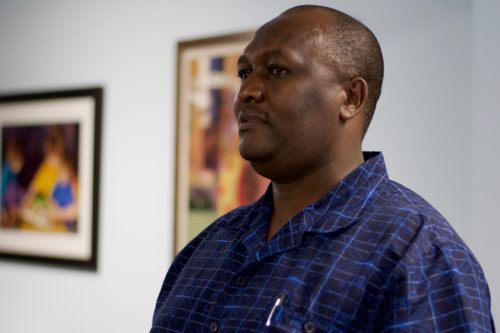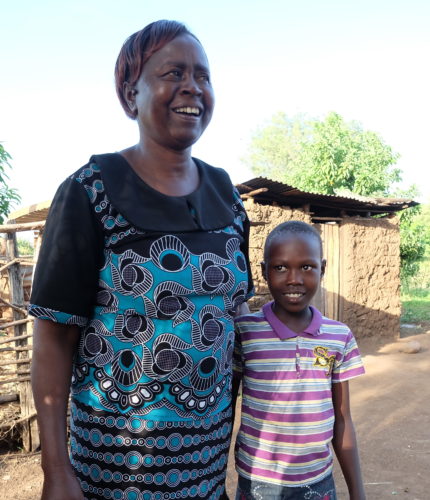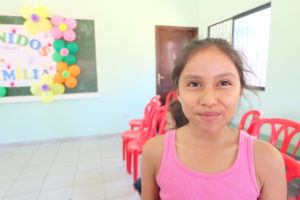It is quite rare that our international volunteer coordinators have the opportunity to visit the Children Incorporated headquarters in North Chesterfield, Virginia — but when they do, it is such a treat for the staff. An exceptional guest dropped by recently — our Volunteer Coordinator and the Manager of St. John’s Community Center in Nairobi, Kenya: Mr. Njuguna. The stories that he recounted about the community center, the people it serves, and the multi-faceted work that it carries out daily were a testament to the practical and holistic approach that St. John’s employs in ensuring that its attendees are truly afforded a chance at a better life – a chance to break free from the piecemeal landscape of the slums.
Nairobi’s most destitute and crime-ridden neighborhood is the slums of Pumwani – and St. John’s Community Center serves its inhabitants, who live in absolutely deplorable conditions.
Nairobi’s most destitute and crime-ridden neighborhood is the slums of Pumwani — and St. John’s Community Center serves its inhabitants, who live in absolutely deplorable conditions. The community center serves children of all ages, as well as the community as a whole. It is comprised of a series of buildings that include a primary school, a childcare clinic, a counseling clinic, a library, administrative offices, and a church.
Mr. Njuguna began his presentation for the Children Incorporated staff with the context of the Mau Mau Uprising, which plagued the better part of the 1950s in Kenya. Also known as the “Kenya Emergency,” the revolt was the result of African resistance to colonialism — and it ultimately yielded Kenya’s independence from British colonization. This was the turning point that set the bloodstained tone for the country’s arduous ongoing struggle towards recovery — a healing that served as the mission of St. John’s Community Center, established to address the immediate needs and concerns of some of Kenya’s most destitute and hopeless at a time when promise was obscured by utter desperation.
No life left unchanged
Mr. Njuguna further explained that about sixty percent of the city of Nairobi’s official population lives in slums. He made reference to an “official” population, because a significant portion of the community is unaccounted for as a result of births occurring in the slums themselves rather than in hospitals, where babies are always registered upon birth. Many of the infants born in slums are never registered with the government due to a lack of resources and knowledge about the complicated process. Unregistered residents, to further complicate things, are unable to obtain employment, which renders them unable to support themselves — much less provide adequate care for their children. This is but one component of the extensive catalog of critical issues that St. John’s Community Center is currently addressing.

Mr. Njuguna spoke with Children Incorporated’s staff about the St. John’s Community Center in Nairobi, Kenya on a recent visit to the office.
With the help of several partnering organizations, St. John’s Community Center boasts one primary focus to which all aspects of its work leads: instilling self-esteem and self-worth in those in attendance so that they may rise above hopelessness. Not only does the community center address poverty, child abuse and neglect, unemployment, and civil ignorance, but it also houses programs for the economic empowerment of women, group meetings in which parents and guardians may share tips and concerns — and youth programs in which all Children Incorporated kids participate. St. John’s even trains its teachers in counseling so that they are better-equipped to address the emotional needs of the community.
Perhaps one of the most essential ways in which Children Incorporated sponsors and donors contribute to the center is through our Mosquito Net Fund, which provides children enrolled in our program with an integral tool in combatting mosquito-borne illnesses, which are prevalent in Kenya. Mr. Njuguna explained during his presentation at our headquarters that these mosquito nets also serve our kids and their families in a less tangible way: because mosquito nets are considered a luxury in the community, those that receive them experience a confidence that only ownership can bring.
St. John’s Community Center strives to address any and all concerns that arise for the community, optimizing the utilization of on-hand resources all the while. When an urgent need for a sanitary bathhouse in a nearby slum presented itself, the community center sought and acquired funding for the construction of one. A question soon arose: Who will maintain the bathhouse? St. John’s implemented a program through which it employs its older youth so that they may learn about responsibility on the job while also earning money to contribute to their households.
When student tardiness became a legitimate worry at St. John’s Community Center, possible resources were investigated for the provision of morning meals in order to ensure a more timely arrival for students. The community center partnered with an organization that provides support for morning porridge, and tardiness has been eliminated almost completely.
A holistic approach in which Children Incorporated plays a meaningful role
The list of programs and interventions realized by St. John’s Community Center goes on: HIV/AIDS prevention programs; life education and pregnancy prevention programs for young girls; skills training programs in handicrafts, and carpentry for adolescents; and civic duties and human rights education for all. Children Incorporated has helped to fund the construction of new classrooms in which these courses are administered, and your contributions help to finance vocational and apprenticeship training.
Children Incorporated’s presence at St. John’s Community Center, in effect, promotes a high retention rate for students.
Our sponsors help to ensure that kids receive the school supplies they need to do their very best; and malaria prevention medications are dispensed to them so that they may be healthy enough to attend classes. Funds from our donors and sponsors currently help to provide lunch to 187 students in attendance at St. John’s Community Center, which has drastically reduced absenteeism among all age groups. No longer hungry during the day, these youth do not need to beg in the streets during the school — or steal — just to get some food in their bellies. Nourished and full, these kids are afforded the chance to concentrate in an environment where they feel safe and protected, so that they may participate, learn, and perform well.
Of utmost importance, Mr. Njuguna explained, the sponsored kids at St. John’s Community Center know that they’re not at risk of the embarrassment of overdue school fees. Children who attend other schools often learn about overdue fees upon arriving, and they are turned away. Sometimes they even find out in front of their peers, which can be humiliating. With school fees paid by sponsorship funds, parents and guardians are able to provide the children in their care with other basic needs, like food; a great burden is lifted. If it weren’t for the payment of school fees, after all, many kids would not have the opportunity to obtain an education – and therefore never have the chance to break the cycle of poverty.
Children Incorporated’s presence at St. John’s Community Center, in effect, promotes a high retention rate for students. Knowing that they will receive primary and secondary support to nourish both their bodies and minds during the school week, children are motivated to attend the community center. Through this integrated nurturing, hope becomes tangible, and feeling it motivates kids to seize the opportunities that are presented to them today in order to have the best tomorrow possible.
A common passion
Mr. Njuguna’s work is heartfelt; while growing up, he himself witnessed the routine struggles of his impoverished parents. As a result, his drive is to incite change – not only in his own life, but also for those in his community. Our mission at Children Incorporated is also to foment change, because we passionately believe that children everywhere deserve education, hope, and opportunity. Contributions encourage change, because our work – and Mr. Njuguna’s work – would not be possible without our donors and sponsors.
Gratitude reverberated in each word that Mr. Njuguna spoke the day that he visited – with each program and benefit that he eagerly described in his presentation. That gratitude is for our supporters; it is for the ones who make our work and his a reality – the ones who are ultimately responsible for the promise that shines brightly in a dark corner of the Pumwani slums in Nairobi.
***
HOW DO I SPONSOR A CHILD IN KENYA?
You can sponsor a child in Kenya in one of three ways: call our office at 1-800-538-5381 and speak with one of our staff members; email us at sponsorship@children-inc.org; or go online to our sponsorship portal, create an account, and search for a child in Kenya that is available for sponsorship.


